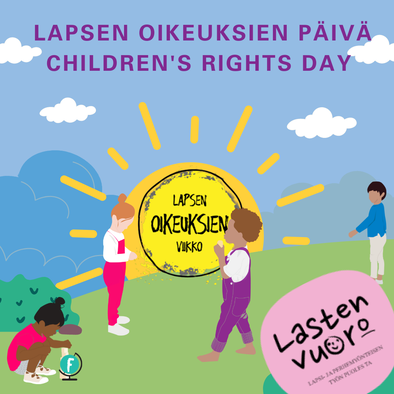|
Have you heard about children's rights on November20th? No? Then let me tell you a little about it! Their very origins go back to the US in 1857, from a pastor who appreciated children a lot, and facilitated the first “rose day”. This tradition later changed to children's day. In December 1954, the United Nations General Assembly invited all countries of the world to establish the Children’s Day, to make the rights of children visible, to exchange and promote understanding towards children, the need of their welfare, and start actions to promote the vision and goals of the UN Charter. In Familia, one of the many things we do to honor this day is promoting the rights of multilingual families and their children. My personal experience is like this too. The first time we applied for my child, there were not enough children to form a group in our municipality, so we were just informed about it and left alone without another solution. In Finland, it is only possible to register one mother tongue, even if the family uses more than one language on a native level. Finland is a bilingual country, with 5.2% Swedish speakers, so it would make sense to allow registration of more than one mother tongue. Nevertheless, it is the case for many bilingual families to choose and register only one language for their children’s official mother tongue, leaving as a second priority other languages that are actually spoken at home.
This fact was assessed with a survey at the beginning of this year done by Familia. The survey's results showed that bilingual families know little on the matter. By law, children with a mother tongue other than Finnish or Swedish are entitled to develop and maintain their mother tongue by professionals. As mentioned, this right is not widely acknowledged by multilingual families. Finland offers the possibility to join “own mother tongue” lessons organized by municipalities outside of school hours. However, there are several issues with this; more than half of the survey participants children do not attend the lessons, either due to the timetable, travel time/distance from home, quality of the lessons, or are just not aware of the children's right to participate, due to the low flow of information from schools or municipalities. Another problem was that, in some cases, not enough children applied, so the lessons either did not take place at all, or the children had to travel to another city to participate. Another concern was the wide age range and different language levels of the children. However, the average score (1 – 5) for the lessons in the survey is 3.2. My personal experience is like this too. The first time we applied for my child, there were not enough children to form a group in our municipality, so we were just informed about it and left alone without another solution. Other times we had issues with timing; it was not possible to join the group at a certain time of the day, due to our own work or therapies appointments, so we also did not participate. During Covid, we did get a spot, but sadly the teacher quit his job a few days before the lessons would start. After some time, there has been a new teacher starting, but again, the timing is not working for us. Now I try to teach my children their mother tongue as well as I can. We use the media a lot, as well as working books in their mother language. Nevertheless, Finland is a great country to raise children and see them growing up, the summers are warm, and you can choose from hundreds of lakes to swim in. The winter is full of beautiful snow and spring and autumn are perfect for jumping into muddy puddles! In comparison to many other countries, Finland is giving parents many great opportunities and to support the right of children to let them enjoy their childhood. Hyvää Lapsen oikeuksien päivää! Happy Child Rights day! Angela
0 Comments
Leave a Reply. |
blogi - blogAjatuksia ja kokemuksia elämästä kahden kulttuurin keskellä.
Reflections and experiences from the life of intercultural families. kategoriat
All
osallistuToivotamme sinut lämpimästi tervetulleeksi osallistumaan blogiyhteisöömme: lue, kommentoi ja kirjoita!
Kirjoittajina voivat toimia kaikki kahden kulttuurin arkea elävät ja aiheesta kiinnostuneet. Kynnystä kirjoittamiselle ei tule nostaa liian korkealle ja kirjoittaa voi joko omalla nimellä tai nimimerkillä. Blogissa esitetyt näkökannat ja mielipiteet ovat kirjoittajien omia, eivätkä edusta Familian kantaa. Kahden kulttuurin arki on itsessään kiinnostavaa ja siitä kirjoittaminen voi avata myös itselle uusia näkökulmia! Blogikirjoituksia voi tarjota sähköpostitse (info@ familiary.fi) tai yhteydenottolomakkeen kautta. Lopullisen valinnan julkaistavista jutuista tekee Familian henkilökunta. Tervetuloa mukaan! participate!We warmly welcome you to participate in our blog community: read, comment, and write!
Anyone who lives and works in the world of intercultural families and is interested in the topic is welcome to contribute. The threshold for writing should not be too high, and you can write either under your own name or under a pseudonym. Keep in mind that the views and opinions expressed in the blog are those of the authors and do not represent the position of Familia. The everyday life of intercultural families is interesting and writing about it can also open new perspectives for you! Your story matters and helps to raise awareness about the opportunities and challenges within intercultural families. Blog contributions can be submitted by e-mail (info@ familiary.fi) or via our contact form. Final selection and edition of the stories to be published will be conducted by our staff. Welcome to join us! |
|
|
© Familia 2024


 RSS Feed
RSS Feed

